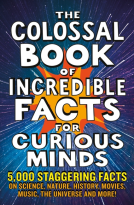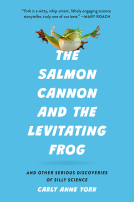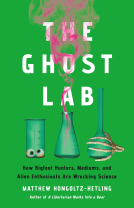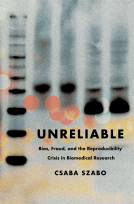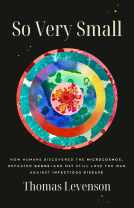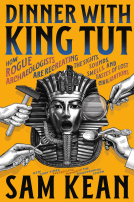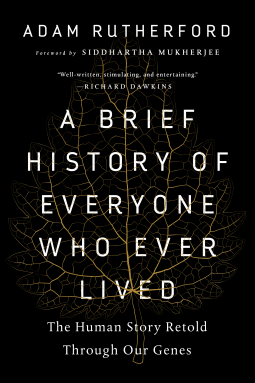
A Brief History of Everyone Who Ever Lived
The Human Story Retold Through Our Genes
by Adam Rutherford
This title was previously available on NetGalley and is now archived.
Send NetGalley books directly to your Kindle or Kindle app
1
To read on a Kindle or Kindle app, please add kindle@netgalley.com as an approved email address to receive files in your Amazon account. Click here for step-by-step instructions.
2
Also find your Kindle email address within your Amazon account, and enter it here.
Pub Date Oct 03 2017 | Archive Date Oct 17 2017
Experiment, The | The Experiment
Description
“Nothing less than a tour de force—a heady amalgam of science, history, a little bit of anthropology and plenty of nuanced, captivating storytelling.”—The New York Times Book Review, Editor's Choice
A National Geographic Best Book of 2017
In our unique genomes, every one of us carries the story of our species—births, deaths, disease, war, famine, migration, and a lot of sex.
But those stories have always been locked away—until now.
Who are our ancestors? Where did they come from? Geneticists have suddenly become historians, and the hard evidence in our DNA has blown the lid off what we thought we knew. Acclaimed science writer Adam Rutherford explains exactly how genomics is completely rewriting the human story—from 100,000 years ago to the present.
A Brief History of Everyone Who Ever Lived will upend your thinking on Neanderthals, evolution, royalty, race, and even redheads. (For example, we now know that at least four human species once roamed the earth.) Plus, here is the remarkable, controversial story of how our genes made their way to the Americas—one that’s still being written, as ever more of us have our DNA sequenced.
Rutherford closes with “A Short Introduction to the Future of Humankind,” filled with provocative questions that we’re on the cusp of answering: Are we still in the grasp of natural selection? Are we evolving for better or worse? And . . . where do we go from here?
Advance Praise
Praise for the UK Edition:
“Well-written, stimulating, and entertaining.”
—Richard Dawkins
“Brilliant, authoritative, surprising, captivating.”
—Brian Cox
Praise for the UK Edition:
“Well-written, stimulating, and entertaining.”
—Richard Dawkins
“Brilliant, authoritative, surprising, captivating.”
—Brian Cox
Available Editions
| EDITION | Other Format |
| ISBN | 9781615194049 |
| PRICE | $25.95 (USD) |
| PAGES | 416 |
Featured Reviews
This is a fantastic science book. The title suggests and achieves its goal.
 Andrea C, Reviewer
Andrea C, Reviewer
Marvellous book, and I couldn't get enough of it! The author does a great job rounding up exactly what makes us, humans, unique and at the same time homogeneous. My favourite sections were of course on our relation to other species of Hominids and the failed attempts by some scientists to show correlation between genetics and predisposal to criminal behaviour. A required reading for anyone looking for a comprehensive understanding of the basics of human genetics, explained in layman terms.
A great, entertaining look at humanity through genetics
I loved this book. It is the second by Adam Rutherford that I've read and I enjoyed it as much as I did the first, Creation. Rutherford writes in plain language and although it is a science book, it reads more like a novel. It is a meandering but fascinating look at human history through DNA, but in jargon-free language. What I like best about the book are: the message that we are all interconnected; Rutherford's great use of the alphabet as an analog for genes and DNA; and Rutherford’s great sense of humor. His description of a medical symposium is as funny as anything I've read. I have read a few history of humanity books lately and not many can match Rutherford’s. One that is a match is “Built on Bones” by Brenna Hassett but both of these books are far superior to Peter Ungar’s Evolution’s Bite. I strongly recommend Rutherford’s book for anyone interested in science.
 Bill C, Reviewer
Bill C, Reviewer
A Brief History of Everyone Who Ever Lived, by Adam Rutherford, is a nicely measured work of popular science that, unlike far too many popular science books/articles, doesn’t overhype its subject matter — advances in deciphering the human genome and how such advances can be applied. Always seeking to inform rather than sell, Rutherford makes for a trustworthy guide whose down-to-earth, realistic perspective doesn’t at all detract from the inherent wonder of science.
He divides the work into two large segments: “the rewriting of the past using genetics, from a time when there were at least four human species on Earth right up to the kings of Europe in the eighteenth century” and an exploration of “who we are todays, and what the study of DNA in the 21st century says about families, health, psychology, race, and the fate of us.” Whether he is discussing how genetics/DNA have helped inform a host of issues, such as what the discovery of Lucy (Australopithecus afrensis) can tell us about human evolution, how King Richard III’s body was uncovered and identified, or why the concept of race is an illusion, he is always careful, to also tell us what DNA cannot do for us. As he says as one point, “DNA is a clue, not a silver bullet. It takes skill and care to make that clue into something valuable.” Or, in fewer words: “Don’t believe the hype” (he levies particular scorn at those companies who seek to monetize genomics, whether through promises of finding your “famous” ancestors or through books that declare they’ve found the real Jack the Ripper).
Much of what Rutherford does is attempt to refute or clarify a lot of myths surrounding genetics and ancestry. Some of it will require patient reading/rereading and thinking on the audience’s part. Not because the science is difficult or because Rutherford employs a lot of jargon — it isn’t and he doesn’t — but because it seems to fly in the face of “common sense.” But we’re not all that great at statistics or large numbers, so our common sense is often, as he lays out clearly, wrong.
He casts a wide net, ranging far afield though always tethered to the focus on DNA/genetics. And so we get discussion of early hominids/evolution, the rise of red hair and white skin, how brown eyes might come about (not quite as simple at what you learned in 10th grade bio), the ugliness of eugenics, the pretend nature of race as a concept, the role of genetics in disease and treatment (“the number of diseases that have been cured as a result of gene therapy? Zero”). Sometimes one may feel a little lost in the seemingly random meandering Rutherford does, but he always circle us back to his main ideas before we feel too far afield. If I had one complaint, it would probably be an occasional lack of focus or structure. But given the clarity of Rutherford’s voice throughout, the patience with which he takes us through concepts that our human minds want to fight against in knee-jerk fusion, his refusal to overhype the science, and his clear sense of enthusiasm and wonder, a complaint about structure is a minor nitpick.
If you’re interested in early human evolution, the first half of the book serves not only as a nice overview complement to other works much more focused on that singular topic but also as a nice tonic against the dumbed down way in which discoveries in that field are reported in newspapers and magazines. The second half of the book, meanwhile, is much more vibrantly involved with our everyday contemporary world. Beyond the science, beyond the promises of medical treatments and discoveries, one could do worse in this politically charged environment than read a book that explains in painstaking fashion why we are all much more alike than we are different, and why those surface difference we cling to — race, nationality, and the like — are mere chimeras.
 Kamaria N, Librarian
Kamaria N, Librarian
This author is absolutely brilliant, he conveys information about this complicated topic in clear language with use of fantastic metaphors and in a manner that I a person with little scientific background can understand. Science and sometimes be funny and it is conveyed here as well. There is so much going on and the author acknowledges at the pace at which science is being challenged, changed and made with every new discovery and technological stride that there will be things that may not even necessarily be true at the time of the publication of the book, but it makes for such a fascinating read.
 Reviewer 314288
Reviewer 314288
A brilliant introduction to how the developments in genetics in the last two decades have helped to unravel the mystery of our origins. This engaging, riveting book not only introduces us to how our ancestors spread throughout the planet but also reveals surprising truths about our own history, and debunks various myths about race.
 Greg Y, Reviewer
Greg Y, Reviewer
"This is a story about you". It's hard to think of a first sentence more likely to engage a reader and beguile them into a 400-page dissertation on DNA and evolution. It gets right to the point and demands attention.
Soon after, Adam Rutherford sums up human evolution as "one big million-year clusterf*ck", and you know that this is not going to be just any science book. And so it proves. <i>A Brief History of Everyone Who Ever Lived</i> is erudite and entertaining, informative and occasionally cerebral.
The book starts with the rise of hominids and the migrations of homo sapiens out of Africa, showing how DNA recovered from fossil finds enabled these migratory pathways to be better understood. For example, DNA has shown that India was settled from both the south and the north, but that both North and South America were settled from the north. Our DNA also shows that homo sapiens and neanderthals interbred.
Rutherford tackles the paradox of "family tree" thinking, which ultimately leads to a point where the number of putative ancestors exceeds the number of people on earth at the time. Oddly, this means that, around the time of Richard II, everybody in Europe was an ancestor of everybody with European descent today. We are apparently all descended from royalty and we all have Viking ancestry.
I found his account of the Hapsburg's inbreeding and the DNA identification of Richard III's remains really interesting, but Rutherford's most potent writing is on race, and he is abundantly clear that there is no genetic basis for the concept of "race". The genetic triggers for skin pigmentation are the same in African and Indian people, yet we perceive these people as being of different "races". The same goes for other characteristics that are used to label a person as being of a certain race. There is no gene for race, and only a tiny number of our 22,000 genes account for the physical differences that we typically use to distinguish between races. We are overwhelmingly more similar than different, wherever we are from.
While I did struggle with some of the concepts in this book, Rutherford's clear explanations and waspish humour kept me engaged throughout what was a fascinating read.
 Renee C, Educator
Renee C, Educator
Thank you to Netgalley for providing me a review copy of this book.
I love books that can present and explain scientific ideas clearly, especially when the idea in question is Human Evolution. It's a topic we usually run out of time for at the end of the year in biology, but its a fascinating topic.
There are so many misconceptions that about regarding what genetics can and can't tell us, and A Brief History does an excellent job addressing those misconceptions. This is a book I will get for my classroom (HS Biology), and refer to it when we start genetics each year.
 Librarian 204255
Librarian 204255
Really enjoyable! I would recommend this for any science book club, but also for anyone who is looking for read alikes to Mukherjee's The Gene or The Emperor of All Maladies. I might even recommend this for someone who enjoyed Neil deGrasse Tyson's Astrophysics for People in a Hurry.
A wonderful well written accounting of science that will expand your beliefs and inform. I found this book captivating and well researched. The subject of DNA , history of our genes and new information not taught in schools will inspire the reader to learn further information as they read. This is a must read for all interested in science and our human history.
Readers who liked this book also liked:
Nigel Henbest; Simon Brew; Sarah Tomley; Ken Okona-Mensah; Tom Parfitt; Trevor Davies; Chas Newkey-Burden
Entertainment & Pop Culture, Humor & Satire, Nonfiction (Adult)

